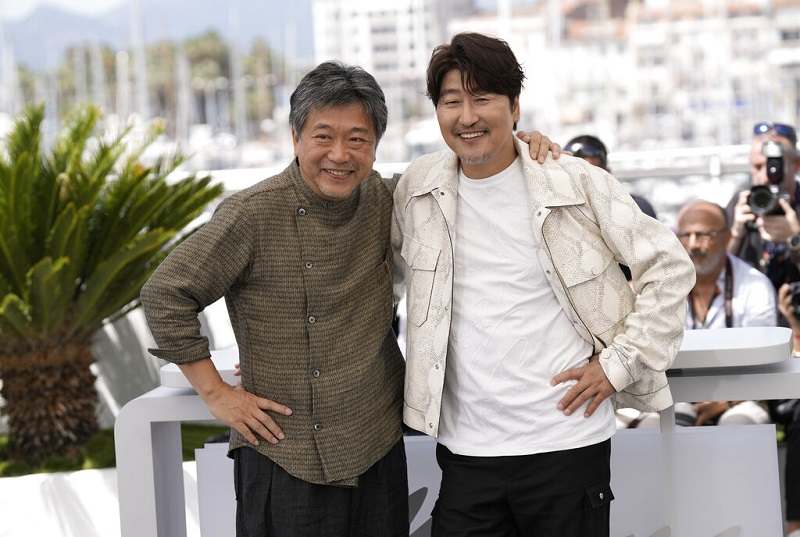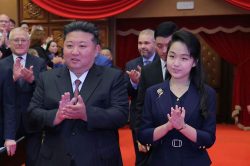
Director Hirokazu Koreeda, left, and Song Kang-ho pose for photographers at the photo call for the film ‘Broker’ at the 75th international film festival, Cannes, southern France, Friday, May 27, 2022.
13:23 JST, May 28, 2022
CANNES, France (AP) — “Shoplifters” director Hirokazu Kore-eda returns to the Cannes Film Festival with “Broker,” another tale of misfits from society’s margins.
This time, the film centers on the use of a “baby box,” a controversial method of anonymously dropping off newborns to be cared for by others used in Japan, South Korea and other parts of the world.
“In Japan, the biggest criticism was that the baby box was making it too easy for the mothers to give up on their responsibility to raise the child. But, on the other hand, some people said that these boxes were actually saving lives because otherwise, the children might die,” he said. “I just thought that was an interesting argument to base a film on.”
The director says his interest in the issue dates back to 2013. “When I was making ‘Like Father, Like Son.’ I researched the Japanese adoption system and it was then that I learned that Kumamoto Prefecture had Japan’s only baby box. So I got interested in that and started to research it. And I learned that Korea had the same kind of baby box, but that they had about 10 times as many babies put in baby boxes in Korea as in Japan,” he said.
“And then in 2016, I came up with the idea for a short plot based on the Korean baby box with Song Kang-ho, starring as a broker.”
Alongside Song (“Snowpiercer,” “Parasite,” “The Throne”), the South Korean drama also stars Bae Doona (“The Host,” “Jupiter Ascending,” “Cloud Atlas”), Gang Dong-won (“Secret Reunion,” “The Priests”), and South Korean singer-songwriter Lee Ji-eun, known as IU.
“Broker” marks the director’s sixth time competing for the Palme d’Or. He was first nominated for Cannes’ top prize in 2001 for “Distance,” then again in 2004 for “Nobody Knows,” in 2013 and for “Our Little Sister” in 2015.
The Japanese director won the Jury Prize at Cannes in 2013 for “Like Father, Like Son” and won the Palme d’Or at the 2018 festival for his highly-acclaimed movie, “Shoplifters.”
Single mothers have long faced stigma in South Korea because pregnancy when out of wedlock is considered inappropriate. They are often pressured and shamed into giving up their children because of deeply sexist and conservative culture, birth registration laws stacked against them, and a largely privatized adoption industry.
“They can find themselves disadvantaged by the system,” he said. “And the mother is the easiest one to criticize because the father isn’t there anymore. So he escapes the criticism.”
When asked whether the film poses a question about what it means to be a family today, Kore-eda called the tale “the story of a pseudo-family.”
“But more important in this case is the two women who have chosen not to be mothers. They are at the center of the story, as well as this life that has been thrown away. So, for me, in this case, life was more central to the film than the family.”
Top Articles in News Services
-

Prudential Life Expected to Face Inspection over Fraud
-

Hong Kong Ex-Publisher Jimmy Lai’s Sentence Raises International Outcry as China Defends It
-

Japan’s Nikkei Stock Average Touches 58,000 as Yen, Jgbs Rally on Election Fallout (UPDATE 1)
-

Trump Names Former Federal Reserve Governor Warsh as the Next Fed Chair, Replacing Powell
-

Suzuki Overtakes Nissan as Japan’s Third‑Largest Automaker in 2025
JN ACCESS RANKING
-

Japan Institute to Use Domestic Commercial Optical Lattice Clock to Set Japan Standard Time
-

Israeli Ambassador to Japan Speaks about Japan’s Role in the Reconstruction of Gaza
-

Man Infected with Measles May Have Come in Contact with Many People in Tokyo, Went to Store, Restaurant Around When Symptoms Emerged
-

China Eyes Rare Earth Foothold in Malaysia to Maintain Dominance, Counter Japan, U.S.
-

Prudential Life Insurance Plans to Fully Compensate for Damages Caused by Fraudulent Actions Without Waiting for Third-Party Committee Review

























